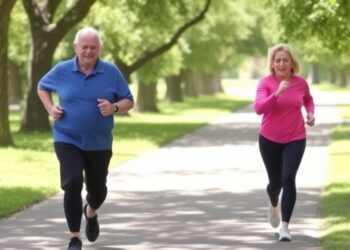Targeted physical training can improve the quality of life of patients with metastatic breast cancer and alleviate fatigue. This is shown by an international randomized multicenter study. In the course of the training program, which included two sessions per week over nine months, disease- and therapy-related symptoms were markedly reduced, which was associated with a improved quality of life compared to the control group. The German Cancer Research Center (DKFZ) was significantly involved in the study, together with the National Center for Tumor Diseases (NCT) Heidelberg and Heidelberg University Hospital. The project, which was funded by the European Union, was coordinated by the University Medical Center Utrecht.
Targeted physical training can improve the quality of life of patients with metastatic breast cancer and alleviate fatigue. This is shown by an international randomized multicenter study. In the course of the training program, which included two sessions per week over nine months, disease- and therapy-related symptoms were markedly reduced, which was associated with a improved quality of life compared to the control group. The German Cancer Research Center (DKFZ) was significantly involved in the study, together with the National Center for Tumor Diseases (NCT) Heidelberg and Heidelberg University Hospital. The project, which was funded by the European Union, was coordinated by the University Medical Center Utrecht.
Maintaining or improving quality of life and alleviating fatigue are important goals in the care of cancer patients. Not only the disease itself, but also the necessary therapies can severely impair quality of life. Many patients suffer from fatigue syndrome, which is characterized by persistent physical, emotional and mental exhaustion.
“Especially women with advanced cancers such as metastatic breast cancer, who usually receive long-term therapy, can benefit greatly from good management of disease- and therapy-related symptoms,” says Karen Steindorf, head of a research division at the DKFZ and NCT Heidelberg. “We hope that the encouraging results of our PREFERABLE-EFFECT study will help to ensure that as many patients as possible are offered the opportunity to take part in a targeted training program.”
Targeted activation, rather than rest, is the appropriate measure to counter fatigue and other stressful symptoms. This has already been proven in studies for patients in the early stages of breast cancer, but there is still no evidence of a corresponding benefit for advanced disease. The PREFERABLE-EFFECT study has now provided this proof.
A total of 355 women and 2 men with metastatic breast cancer were included in the randomized controlled trial. All study participants received basic exercise recommendations and were fitted with an activity tracker to record the amount of exercise they did in everyday life. “The training group of 178 participants also took part in an individually adapted and therapeutically supervised training program twice a week, which included exercises to strengthen balance, muscle strength and endurance. In the last three months, one of the two training sessions was also carried out with the help of an app,” explains Joachim Wiskemann from Heidelberg University Hospital, whose working group examined and supervised the Heidelberg study participants in terms of sports therapy.
At the start of the study and after 3, 6 and 9 months, the participants were asked about their quality of life using a standardized questionnaire that took into account physical, mental and emotional aspects of quality of life. In addition, a standardized questionnaire was used to objectify fatigue symptoms. Physical fitness was tested at the beginning and at three-month intervals on the bicycle ergometer.
The structured training program led to a statistically significant improvement in quality of life and a significant reduction in fatigue. Complaints such as pain and shortness of breath decreased significantly over the course of the study. The fitness test was also better in the training group than in the control group.
“These are very encouraging training effects that the patients can feel in their everyday lives,” comments Karen Steindorf. “Structured training improves quality of life in a relevant way and enables women with advanced breast cancer to lead a more active life. We were also able to demonstrate greater participation in social life. Based on the PREFERABLE-EFFECT data, there is now good evidence to recommend that people in advanced stages of the disease should also take part in a targeted training program.”
The “OnkoAktiv” network founded at the NCT Heidelberg supports cancer patients with training programs close to home.
Hiensch AE et al. Effects of a structured and individualized exercise program on fatigue and health-related quality of life in patients with metastatic breast cancer: results of the multinational randomized controlled PREFERABLE-EFFECT study.
Nature Medicine 2024, DOI: 10.1038/s41591-024-03143-y
Journal
Nature Medicine




